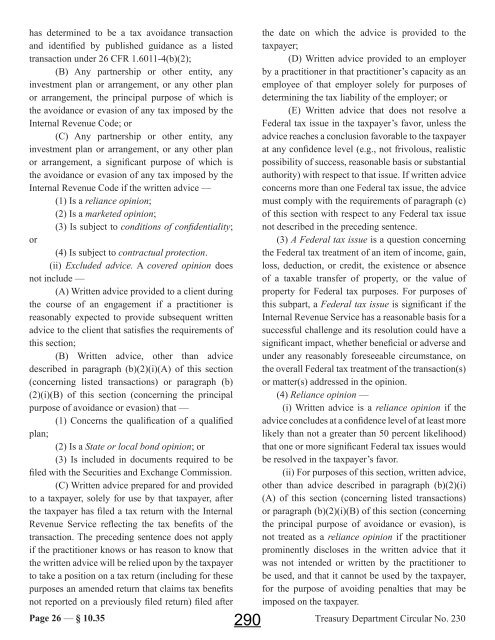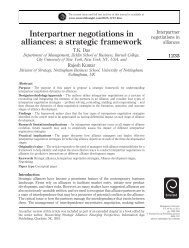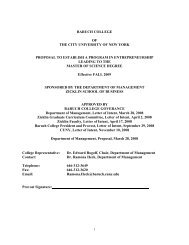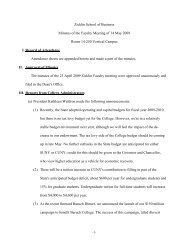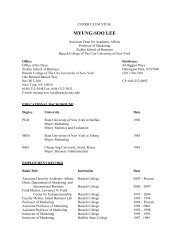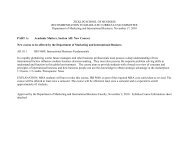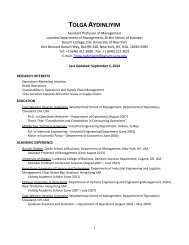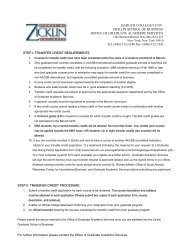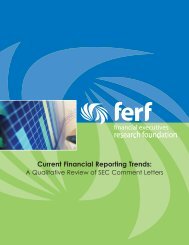Tax Seminar #3 – December 3 2012
Workbook - Zicklin School of Business
Workbook - Zicklin School of Business
You also want an ePaper? Increase the reach of your titles
YUMPU automatically turns print PDFs into web optimized ePapers that Google loves.
has determined to be a tax avoidance transaction<br />
and identified by published guidance as a listed<br />
transaction under 26 CFR 1.6011-4(b)(2);<br />
(B) Any partnership or other entity, any<br />
investment plan or arrangement, or any other plan<br />
or arrangement, the principal purpose of which is<br />
the avoidance or evasion of any tax imposed by the<br />
Internal Revenue Code; or<br />
(C) Any partnership or other entity, any<br />
investment plan or arrangement, or any other plan<br />
or arrangement, a significant purpose of which is<br />
the avoidance or evasion of any tax imposed by the<br />
Internal Revenue Code if the written advice —<br />
(1) Is a reliance opinion;<br />
(2) Is a marketed opinion;<br />
(3) Is subject to conditions of confidentiality;<br />
or<br />
(4) Is subject to contractual protection.<br />
(ii) Excluded advice. A covered opinion does<br />
not include —<br />
(A) Written advice provided to a client during<br />
the course of an engagement if a practitioner is<br />
reasonably expected to provide subsequent written<br />
advice to the client that satisfies the requirements of<br />
this section;<br />
(B) Written advice, other than advice<br />
described in paragraph (b)(2)(i)(A) of this section<br />
(concerning listed transactions) or paragraph (b)<br />
(2)(i)(B) of this section (concerning the principal<br />
purpose of avoidance or evasion) that —<br />
(1) Concerns the qualification of a qualified<br />
plan;<br />
(2) Is a State or local bond opinion; or<br />
(3) Is included in documents required to be<br />
filed with the Securities and Exchange Commission.<br />
(C) Written advice prepared for and provided<br />
to a taxpayer, solely for use by that taxpayer, after<br />
the taxpayer has filed a tax return with the Internal<br />
Revenue Service reflecting the tax benefits of the<br />
transaction. The preceding sentence does not apply<br />
if the practitioner knows or has reason to know that<br />
the written advice will be relied upon by the taxpayer<br />
to take a position on a tax return (including for these<br />
purposes an amended return that claims tax benefits<br />
not reported on a previously filed return) filed after<br />
the date on which the advice is provided to the<br />
taxpayer;<br />
(D) Written advice provided to an employer<br />
by a practitioner in that practitioner’s capacity as an<br />
employee of that employer solely for purposes of<br />
determining the tax liability of the employer; or<br />
(E) Written advice that does not resolve a<br />
Federal tax issue in the taxpayer’s favor, unless the<br />
advice reaches a conclusion favorable to the taxpayer<br />
at any confidence level (e.g., not frivolous, realistic<br />
possibility of success, reasonable basis or substantial<br />
authority) with respect to that issue. If written advice<br />
concerns more than one Federal tax issue, the advice<br />
must comply with the requirements of paragraph (c)<br />
of this section with respect to any Federal tax issue<br />
not described in the preceding sentence.<br />
(3) A Federal tax issue is a question concerning<br />
the Federal tax treatment of an item of income, gain,<br />
loss, deduction, or credit, the existence or absence<br />
of a taxable transfer of property, or the value of<br />
property for Federal tax purposes. For purposes of<br />
this subpart, a Federal tax issue is significant if the<br />
Internal Revenue Service has a reasonable basis for a<br />
successful challenge and its resolution could have a<br />
significant impact, whether beneficial or adverse and<br />
under any reasonably foreseeable circumstance, on<br />
the overall Federal tax treatment of the transaction(s)<br />
or matter(s) addressed in the opinion.<br />
(4) Reliance opinion —<br />
(i) Written advice is a reliance opinion if the<br />
advice concludes at a confidence level of at least more<br />
likely than not a greater than 50 percent likelihood)<br />
that one or more significant Federal tax issues would<br />
be resolved in the taxpayer’s favor.<br />
(ii) For purposes of this section, written advice,<br />
other than advice described in paragraph (b)(2)(i)<br />
(A) of this section (concerning listed transactions)<br />
or paragraph (b)(2)(i)(B) of this section (concerning<br />
the principal purpose of avoidance or evasion), is<br />
not treated as a reliance opinion if the practitioner<br />
prominently discloses in the written advice that it<br />
was not intended or written by the practitioner to<br />
be used, and that it cannot be used by the taxpayer,<br />
for the purpose of avoiding penalties that may be<br />
imposed on the taxpayer.<br />
Page 26 — § 10.35<br />
290<br />
Treasury Department Circular No. 230


